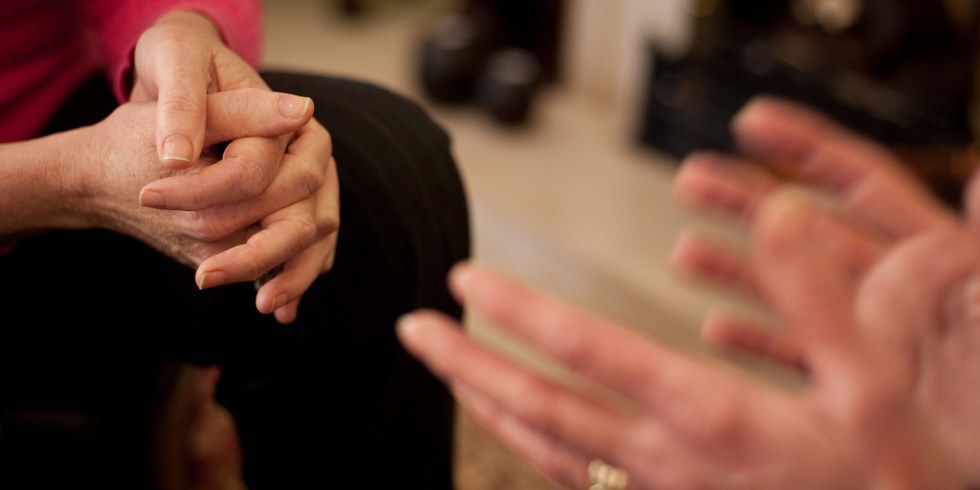First and foremost, I wish to dismantle a myth:
"This will be the best four years of your life."
We've all heard that from someone. College is remembered by many adults as a sort of boozy Garden of Eden, where innocence can be joyously lost through sex and drugs and experimentation and the acquisition of knowledge while we're still shielded from the mundane responsibilities of adulthood. And for someone who's now doing their taxes or working as a barista or sitting on debt or raising kids, feeling nostalgia for "easier" college days is understandable.
But college is not a sanctuary from the rest of the world, and it's frustrating to hear people predict -- with total confidence -- that their rosy undergrad memories will line up with our reality. Many students at college are touched by financial issues, health concerns, racism and sexism and other profound struggles -- including grief, the issue I want to focus on today.
By blithely repeating the "best four years" prophecy to college-aged kids, it makes it a shameful thing to admit that we are experiencing struggles and obstacles. And when we experience something as earth-shattering as grief, there's an urge to pretend that everything is going according to plan. That we're fine because we're supposed to be fine.
This effect can be amplified by well-meaning friends who want to cheer us up, and by professors who expect us to get back in the saddle after a few penciled-in days of acceptable mourning. But grief is not tidy. It does not behave "appropriately." And when you're far from home, fragile, unprepared, buried in schoolwork, and being fed the message that your feelings do not fit in the happy dream of The College Experience (TM), it's easy to feel alienated and confused.
So here is my advice to you, if you someday lose a loved one at college, or if you are already experiencing a messy, ugly, untidy encounter with grief:
1. Remember it's OK to not be OK.
Your friends tell you to stop being mopey or get frustrated when they can't cheer you up. Your professor will expect you back in the classroom within the week, and she won't extend your paper deadline. You have to put on a smiling face for your shifts at the student store. People stop saying they're "sorry for your loss," and start wondering when you're going to get back to normal. All these are symptoms of the world moving on, and it's easy to feel stuck -- like you have to put on a show of being fine because everybody else is. But grief doesn't have a schedule. Give yourself time to heal, and don't pressure yourself to "get better." Your feelings are real, and shouldn't be ignored or repressed.
2. Find your advocates.
It can be especially challenging to lose a loved one at college. But the stress of looming midterms or finals can make it almost impossible to focus on slowing down or taking care of yourself. Many people coping with grief struggle academically because of it. But in most cases, your college has resources in place to help you. Talk to your advisor or your Dean of Students: their job is to advocate for you. They can intervene with professors, give you academic advice, and help you through taking time off from school if that's what you need.
3. Get support.
Everyone who knows me knows how much I freaking love therapy. There's a social stigma around seeking professional help for mental and emotional issues, which is about as helpful as someone telling you that you should buck up about that broken leg instead of seeing a doctor. Let's face it: that leg isn't going to fix itself. Your body might be doing the work of healing, but you need an expert to aid the process. Your brain isn't any different. Use your school's resources to find a therapist who can help you. If financial issues are a concern, see if there's a scholarship or fund available. (If there isn't, call me, and I'll yell at the administration for you because that is just ridiculous.)
Therapy can help you understand the process of grief, validate your feelings, and suggest healthy coping mechanisms. You can also consider group therapy or support groups if finding a supportive community is important to you.
4. Be honest about your feelings.
In college, many people around you will likely never have experienced profound trauma or loss -- and even if they have, every experience is different. Your friends may want to help, but be at a loss as to how. They may try to make you cheer up when it's the last thing you feel like doing, and seem upset when they fail. They might become upset when you don't want to go out to parties, or not know what to do when you cry in their arms or shut down emotionally. They may tell you that "everything happens for a reason," or "they're in a better place." (For the record, please never say this to a grieving person, EVER. Never. Never, ever, ever ever.) Being honest with them about what you feel and what you need is the most important thing for the relationship -- if they're being insensitive, misguided, or unhelpful, you have the right to tell them. (And if they really want to help you, they'll want to know when they're messing up!)
5. Take care of yourself.
Whatever this means to you, do it. Drink a lot of water (especially if you're crying a lot, it's easy to get dehydrated). Sleep. Write poetry and don't show anyone. Write poetry and perform it for everyone. Take out the eight stuffed animals you smuggled into your dorm room and snuggle with them. Be proud of what you accomplish, even if it's just finishing one homework assignment, or putting on pants (enough of a struggle on a normal day.) Spend time with your friends. Eat an entire pan of brownies. Run on the treadmill until your legs are wobbly. Your grief will come out in unexpected ways, at unexpected times, and keeping yourself healthy and loved will help you deal with it when it comes.
Whether you feel better after a week, or a month, or you're still grieving just as much a year or ten later, your feelings are not wrong. Despite a society that prioritizes your productivity and doesn't have much room for grief, it's OK to feel like you're falling behind, or that you need to stop studying and working for a while. And despite the great myth of the Awesome Super-fun College Experience, it's OK to not be having the best time of your life.
So I, Random Internet Author, authorize you to be sad and untidy and angry and grieving. Your emotions should be recognized and honored by your school, your professors, and your family and friends. There is nothing wrong with you, I promise. However alienated and confused and frustrated you may be in your grief, you are not alone.



























